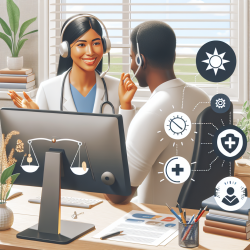In the evolving landscape of special education, maintaining research fidelity is paramount. A recent study titled Maintaining Research Fidelity: Remote Training and Monitoring of Clinical Assistants in Aphasia Research sheds light on innovative methodologies that can revolutionize how we approach remote training and supervision. As Special Education Directors, it is crucial to harness these insights to enhance our practice and ensure the highest standards of care for our students.
The study emphasizes a three-step process to ensure research fidelity:
- Remotely Selecting and Training Data Collectors: The researchers developed a comprehensive training protocol, including mock data collection sessions. This rigorous approach ensured that only the most competent individuals were selected, significantly reducing the risk of Type III errors.
- Remotely Supervising Data Collection and Management: Continuous e-supervision via video recordings allowed for real-time feedback and adjustments. This method not only improved the data collectors' performance but also ensured the integrity of the data collected.
- Optimizing and Monitoring Screening/Assessment Fidelity: Detailed manuals and multiple training videos were used to train data collectors. Regular monitoring and feedback ensured that the screenings were conducted accurately, maintaining the study's methodological integrity.
By implementing these strategies, we can improve our remote training programs and ensure that our therapists and clinical assistants are well-prepared to deliver high-quality services. This is particularly relevant in the context of online therapy services provided by companies like TinyEYE, where remote training and supervision are integral to our operations.
Moreover, this study serves as a call to action for practitioners to engage in further research and continuously seek innovative ways to enhance their practice. By doing so, we can contribute to the growing body of knowledge in special education and ensure that our students receive the best possible support.
To read the original research paper, please follow this link: Maintaining Research Fidelity: Remote Training and Monitoring of Clinical Assistants in Aphasia Research.










